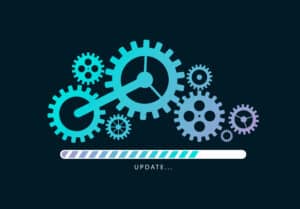In the fast-paced world of medical and dental practices, ensuring that your computer hardware is up-to-date is not just a matter of efficiency—it is a critical component of your security strategy. With increasing cyber threats and stringent regulations like HIPAA (Health Insurance Portability and Accountability Act), outdated hardware can expose your practice to significant risks. Here, we delve into why upgrading your computer hardware is essential, focusing on security, HIPAA compliance, performance, and the benefits of leasing versus buying hardware.
Security Risks and HIPAA Compliance
Outdated computer hardware poses a severe risk to the security of your practice’s sensitive information. Old hardware often lacks the capability to support the latest security software and operating system updates, leaving your systems vulnerable to cyberattacks. Cybercriminals are constantly developing new methods to exploit weaknesses, and older systems are prime targets due to known vulnerabilities that are no longer patched by updates.
For medical and dental practices, these vulnerabilities are not just theoretical concerns—they have direct implications for HIPAA compliance. HIPAA mandates that all patient information be protected from unauthorized access, and failing to maintain updated hardware can result in data breaches that lead to hefty fines and legal repercussions. According to the Department of Health and Human Services (HHS), data breaches involving unsecured electronic protected health information (ePHI) can result in fines ranging from $100 to $50,000 per violation, with a maximum annual penalty of $1.5 million.
Performance and Reliability
Beyond security, outdated hardware can severely impact the performance and reliability of your practice’s operations. Slow, unreliable systems can lead to longer patient wait times, decreased productivity, and ultimately, a reduction in the quality of care provided. Upgrading your hardware ensures that your practice management software runs smoothly, enabling your staff to focus on patient care rather than troubleshooting technical issues.
Modern hardware also supports the latest features and functionalities of your practice management software, such as MacPractice, which can streamline administrative tasks, improve patient engagement, and enhance overall operational efficiency. Investing in new hardware means fewer system crashes, faster processing times, and more reliable access to patient records and other critical information.
Buying vs. Leasing Hardware
When it comes to upgrading your hardware, practices often face the decision of whether to buy or lease. Each option has its advantages, but for many practices, especially those without in-house technical experts, leasing can be a more attractive option.
Advantages of Leasing Hardware:
-
- Cost-Effectiveness: Leasing allows you to spread the cost of new hardware over time, making it easier to manage your budget without a large upfront expenditure.
-
- Regular Upgrades: Leasing agreements often include provisions for regular upgrades, ensuring that your hardware remains current and capable of supporting the latest software and security updates.
-
- Maintenance and Support: Many leasing contracts include maintenance and support services, reducing the burden on your staff to manage technical issues and repairs.
-
- Flexibility: Leasing provides the flexibility to scale your hardware needs up or down based on your practice’s growth and changing requirements.
Buying Hardware:
-
- Ownership: Buying hardware means you own the equipment outright, which can be more cost-effective in the long run if the hardware remains functional and relevant for many years.
-
- No Contracts: There are no ongoing contractual obligations, giving you complete control over your hardware.
However, owning hardware also means bearing the full responsibility for maintenance, repairs, and eventual replacements, which can be challenging without dedicated IT support.
Our Connections with Local Apple/Mac Reps
For practices considering an upgrade to Apple hardware, we have established connections with local Apple/Mac representatives who can provide tailored advice and solutions to meet your specific needs. Whether you’re looking to buy or lease, our account managers can connect you with the right contacts to ensure a seamless transition to new hardware.
Conclusion
Upgrading your practice’s computer hardware is a crucial step in protecting against security risks and ensuring HIPAA compliance. Modern hardware enhances performance and reliability, enabling your staff to deliver high-quality care without the distraction of technical issues. Leasing hardware can offer financial flexibility and ongoing support, making it an ideal solution for practices without in-house technical expertise.
To explore the best hardware solutions for your practice, reach out to our account managers at MacPractice. They can provide specific contact details for local Apple/Mac representatives who can assist you in making informed decisions about your hardware needs.
Investing in up-to-date hardware is not just about staying current; it’s about safeguarding your practice’s future. By taking proactive steps to upgrade, you can protect sensitive patient information, comply with regulatory requirements, and enhance the overall efficiency of your practice.


